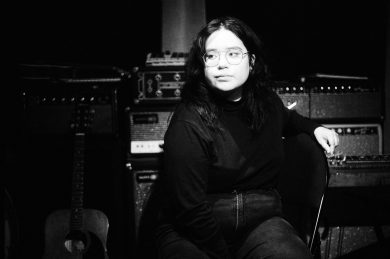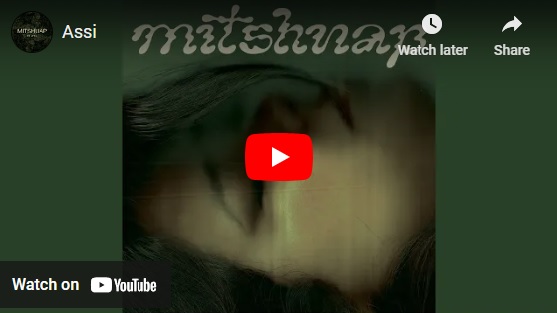After a self-titled EP (2019), Innu singer-songwriter Karen Pinette-Fontaine, known as Kanen, released her debut album, Mitshuap (house, in Innu-aimun) in the spring of 2023. She’s since endeavoured to get on any stage that will have her, to shine and fill the space with words from her home, Uashat mak Mani-Utenam.
 Kanen’s songs are a never-ending process of discovery, and she’s learned the language of her ancestors in order to sing in it.
Kanen’s songs are a never-ending process of discovery, and she’s learned the language of her ancestors in order to sing in it.
“I didn’t think I had such a personal bond with the territory,” she says. “But as it turns out, in the Innu language, the way you perceive the environment exists grammatically, if you will. There’s the inanimate and the animate. That which exists and that which is immobile. There’s a lot of life in the language of where I’m from… It’s like a movement, a breath.”
Artistically, she feels at the heart of this constant discovery: “My identity as an Innu woman, the territory where I live, my militancy, politics…,” says the singer-songwriter. Musically, Kanen refuses to stand still, and nourishes herself with anything she can get her hands on. “My two producers [Simon Walls and Jérémie Essiambre] opened a lot of doors for me that I didn’t even know existed, and I can now go much further than I thought in my compositions,” she says.
Anyone who’s enjoyed Kanen’s songs and onstage movement on the festival circuit in the summer of 2023 can attest to one thing: everything you hear on her album comes out onstage with the renewed energy of a fighter who demands to be heard.
“I think this physical expression of music makes me feel good and proud,” she explains. “I love expressing myself, but it doesn’t come easily. Music has made it easy for me to say stuff. I write, compose. and sing.”
And onstage, Kanen’s singing becomes a thousand times bigger. Her desire to take every person in the audience by the hand, to invite them into her story, becomes real. Night after night, she plants her roots knowing that she has to take over the space in the nicest possible way. “I hit my target,” she says laughing. “I take a bit of home with me everywhere I go and share it, like I do with my stage musicians. It magnifies the message, the singing, and the ideas.”
There’s no doubt in her mind that Indigenous languages need to be learned and expanded if they’re going to survive, and the current trend is palpable to Kanen. “We’re in a good zone,” she says. “Learning is the hardest part, but I think we’re allowing ourselves to multiply the ways we can learn. People take classes and understand what Indigenous languages can bring them, and how they can say things differently.” And obviously, she perceives music as a vehicle for words that need to be heard. This is how she can do her part.
What Kanen needs is to write is an Innu dictionary for herself. “I have to bend over backwards even to write a simple sentence,” she says, laughing. “I did take Innu-aimun lessons, but it’s never enough for everything I’d love to say. There are words that describe a vision or a state of being. I want my lyrics to be very descriptive. I often wonder where my subject is at once I’ve completed my sentence. It really is a lot of work.”
She does confirm that mixing French and Innu was essential for her first album. “It would be far from being released if I’d restricted myself to Innu,” she chuckles. As a matter of fact, it’s by looking at what she’s writing that she’s able to understand where she stands in her learning process.
“The next album certainly won’t be 100% in Indigenous language, but again, it’ll reflect where I’m at. It’s been so long since I’ve created something,” she admits. “But before that, I want to learn new instruments and come out of my Mitshuap cocoon. I have a few texts here and there… It’s simmering slowly.”
In the meantime, she pumps her fist in the air, dances, sings, and smashes guitars onstage. “There’s a quiet strength inside me that I know will take quite a while to let out,” she says with a laugh.
